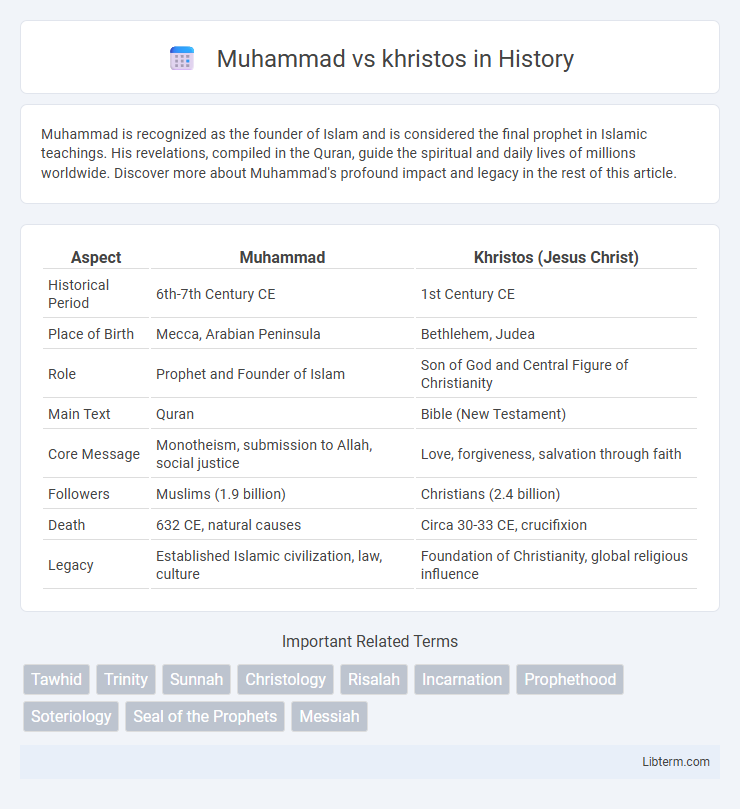Muhammad is recognized as the founder of Islam and is considered the final prophet in Islamic teachings. His revelations, compiled in the Quran, guide the spiritual and daily lives of millions worldwide. Discover more about Muhammad's profound impact and legacy in the rest of this article.
Table of Comparison
| Aspect | Muhammad | Khristos (Jesus Christ) |
|---|---|---|
| Historical Period | 6th-7th Century CE | 1st Century CE |
| Place of Birth | Mecca, Arabian Peninsula | Bethlehem, Judea |
| Role | Prophet and Founder of Islam | Son of God and Central Figure of Christianity |
| Main Text | Quran | Bible (New Testament) |
| Core Message | Monotheism, submission to Allah, social justice | Love, forgiveness, salvation through faith |
| Followers | Muslims (1.9 billion) | Christians (2.4 billion) |
| Death | 632 CE, natural causes | Circa 30-33 CE, crucifixion |
| Legacy | Established Islamic civilization, law, culture | Foundation of Christianity, global religious influence |
Historical Backgrounds of Muhammad and Khristos
Muhammad, born in 570 CE in Mecca, was the founder of Islam and is regarded as the last prophet in Islamic tradition, having received divine revelations compiled into the Quran. Khristos, or Christ, refers to Jesus of Nazareth, a Jewish preacher in 1st-century Roman Judea, considered the central figure of Christianity and believed to be the Messiah prophesied in Hebrew scriptures. Both figures profoundly shaped religious history, with Muhammad establishing a monotheistic community in the Arabian Peninsula, while Jesus' teachings laid the foundation for Christian theology and ecclesiastical traditions.
Foundational Teachings: Islam and Christianity
Muhammad's foundational teachings in Islam emphasize strict monotheism (Tawhid), the prophethood of Muhammad as the final messenger, and the Quran as the ultimate divine revelation. Christianity's foundational teachings, centered on Khristos (Christ), focus on the belief in the Trinity, Jesus Christ as the Son of God and Savior, and the message of salvation through faith, grace, and resurrection. Both religions advocate moral conduct, worship, and accountability in the afterlife but diverge significantly in the understanding of God's nature and the path to spiritual fulfillment.
Early Life and Prophetic Call
Muhammad was born in Mecca around 570 CE into the Quraysh tribe, experiencing early orphanhood before being raised by his grandfather and uncle. At age 40, he received his first revelation from the angel Gabriel, marking the beginning of his prophetic mission in Islam. Khristos, associated with Jesus Christ, was born in Bethlehem under Roman rule, raised in Nazareth, and began his public ministry around age 30 after his baptism by John the Baptist, receiving a divine calling to preach about the Kingdom of God.
Key Messages and Major Revelations
Muhammad's key message centers on strict monotheism, prophethood, and submission to Allah, emphasizing the Quran as the final revelation guiding moral conduct and social justice. Khristos, or Jesus Christ, emphasizes the Kingdom of God, love, forgiveness, and salvation through faith and grace, with the New Testament portraying him as the Son of God and promised Messiah. Both figures reveal transformative spiritual truths shaping major world religions--Islam and Christianity--highlighting divine guidance, ethical living, and ultimate redemption.
Impact on Society and Civilization
Muhammad's teachings established the foundation of Islam, profoundly influencing Middle Eastern culture, law, and governance, while promoting social justice and community welfare across Muslim societies. Khristos, central to Christianity, shaped Western civilization through the spread of Christian ethics, art, education, and legal systems, contributing to the development of European identity and moral frameworks. Both figures catalyzed significant transformations in societal values, legal principles, and cultural practices that continue to resonate in contemporary global civilizations.
Leadership Styles and Methods
Muhammad's leadership style was transformational, emphasizing spiritual guidance, community building, and direct engagement with followers through revelation and example, fostering a unified ummah. Khristos, commonly associated with Jesus Christ, primarily practiced servant leadership, prioritizing humility, compassion, and teaching through parables to inspire moral integrity and personal sacrifice. Both figures employed influential methods--Muhammad utilized clear legal frameworks and strategic alliances, while Khristos focused on revolutionary ethical principles and parabolic storytelling.
Miracles and Signs: Comparative Accounts
Muhammad's miracles include the Quran as an enduring linguistic and spiritual phenomenon, the splitting of the moon, and healing acts reported by followers, serving as divine signs affirming his prophethood. In contrast, Khristos (Jesus Christ) is credited with miracles such as healing the sick, raising the dead, turning water into wine, and performing exorcisms, underscoring his divine authority and messianic role. Both figures' miracles serve as foundational testimonies within Islam and Christianity, reflecting their unique theological contexts and affirming their spiritual missions.
Followers and Expansion of Faiths
Muhammad, the founder of Islam, saw rapid expansion of his faith through the Arabian Peninsula during the 7th century, amassing millions of followers by emphasizing monotheism and social justice. Christianity, centered on Jesus Christ (Khristos), spread widely across the Roman Empire and beyond, leveraging early missionary work and imperial endorsement to attract diverse populations. The global Muslim population now exceeds 1.9 billion, while Christianity remains the world's largest religion with over 2.4 billion adherents, reflecting their profound historical growth and enduring influence.
Legacy and Influence in Modern Times
Muhammad's legacy as the founder of Islam profoundly shapes the religious, cultural, and political landscapes of over 1.8 billion Muslims worldwide, influencing legal systems, social norms, and global geopolitics. Khristos, central to Christianity, impacts the beliefs and practices of approximately 2.4 billion Christians, guiding ethical frameworks, art, and Western civilization's development. Both figures remain pivotal in interfaith dialogues, shaping contemporary discussions on morality, identity, and cultural heritage.
Interfaith Dialogue: Muhammad and Khristos Today
Muhammad and Khristos symbolize foundational figures in Islam and Christianity, respectively, whose teachings shape billions of adherents worldwide. Contemporary interfaith dialogue emphasizes their shared principles of compassion, justice, and peace, fostering mutual understanding and respect among Muslim and Christian communities. Engaging with the spiritual legacies of Muhammad and Khristos enhances cooperation on global issues such as social justice, human rights, and conflict resolution.
Muhammad Infographic

 libterm.com
libterm.com